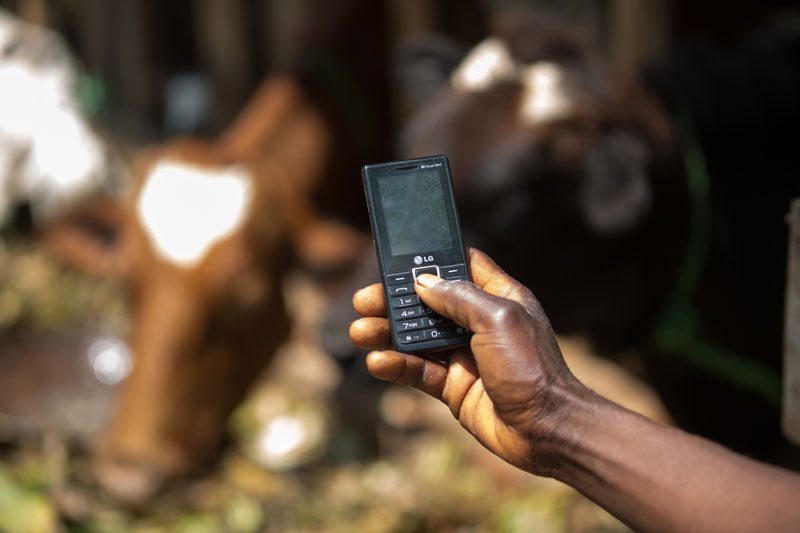
1. Expand access to digital infrastructure and tools.
Digital Training. Amid social distancing restrictions, remote learning expanded access to critical business and farming skills to people around the world. As demonstrated in many TechnoServe programs this year, participants in remote learning often achieved results comparable to those of in-person cohorts. While in-person guidance is still important for many kinds of training, greater investment in digital infrastructure is needed to allow millions more people to access the guidance they need to improve their livelihoods and their lives. And to achieve maximum impact, digital training must be carefully tailored to meet the needs of the end user.
Digital Supply Chain Tools. As traditional supply chains are reimagined in the wake of the COVID-19 crisis, digital tools will play a more important role than ever. Many small-scale producers have already shifted to remote platforms to connect with buyers and suppliers—improving both their resilience against future crises and their general economic opportunities. But for this shift to truly enable equitable growth, the technology must be more responsive to local needs. And the most cutting-edge solution is not always the best. Familiar digital platforms can be repurposed to address novel challenges—such as establishing WhatsApp groups to connect buyers and sellers when previous supply chain connections are disrupted. Many of these digital solutions can be most effective when paired with patient capital and technical assistance.
Online Marketing. Many businesses also made the jump to online sales and marketing during the COVID-19 crisis—and they won’t be looking back. Even the most crowded urban shops will need a toehold in online retail, social media, or other means of reaching customers remotely. Effective training for these entrepreneurs should therefore include topics like digital literacy, online marketing and communications, and data analytics. This will enable them to improve their business operations and also remain competitive during market shocks.

2. Improve women’s resilience to economic shocks.
Financial independence. With fewer savings and assets, women are particularly vulnerable to economic disruptions like the 2020 pandemic. These risks can be mitigated, however, when women form their own savings groups or even become mobile banking agents, helping other women access inclusive financial products. In places where women are discouraged from running their own farms or businesses, they can be supported to pursue other means of generating independent income, such as growing produce in backyard gardens or raising small ruminants like sheep and goats.
Market linkages. Digital platforms linking buyers and suppliers can help even the playing field for women farmers and entrepreneurs, whose business networks are often thinner than men’s. Women can also benefit enormously from membership in farmer and business groups, especially in leadership roles. These established entities can more easily link their members to training, finance, supplies, and market opportunities.
Social support. Women often need support that goes beyond the business realm to ensure their financial success. Coronavirus recovery programs must proactively address restrictive cultural norms; work to engage the support of women’s families; and provide training sessions in times and places that are accessible for women, particularly those with children.

3. Strengthen agricultural supply chains.
Agricultural intermediaries. The businesses that form the spine of supply chains connecting producers to consumers are too rarely recognized as the linchpin of the agricultural sector. These “intermediaries”—such as food processors, transporters, and crop aggregators—need greater support in order to bolster the economic recovery of millions of farmers and retailers (in addition to their own businesses). Concessional finance paired with technical assistance is a particularly potent means of ensuring that these intermediaries can continue supporting other market players while adapting their business models for long-term survival.
Local linkages. More local market connections will reduce risks for many businesses left reeling from disruptions to cross-border supply chains. Many enterprises will therefore benefit from shoring up local markets and supply chains before seeking to expand internationally. In particular, agricultural intermediaries like food processors can reduce risk along the entire supply chain by cultivating stronger local supplier relationships. They could, for instance, invest in extension services or input subsidies for farmers that sell to them, reducing the likelihood of a future shortfall in raw materials while boosting employment and local farmers’ incomes and productivity.

4. Improve small business adaptability.
Crisis management. When the COVID-19 crisis hit, millions of entrepreneurs needed to quickly pivot from “business as usual” to ensure the survival of their businesses. In times of economic disruption, small business owners in the developing world require ready access to tools and guidance that can help their businesses weather the storm. They need to quickly understand how to preserve liquidity and to identify and exploit new business opportunities. (TechnoServe’s crisis toolkit provides one blueprint for this approach.) Greater business insight and adaptability will enable these entrepreneurs to withstand future crises, while also improving their everyday operations.
Improved digital training. The post-pandemic expansion of digital training programs will not be enough, on its own, for many entrepreneurs. According to a recent TechnoServe survey, 49% of small business owners had already tried some kind of remote training. What they often need from remote learning is not greater access, but greater quality. TechnoServe’s research found that programs must be carefully and extensively tailored to entrepreneurs’ specific level of digital engagement, with a strong structure and accountability mechanisms. The content also needs to be immediately applicable to participants’ businesses, and presented in a variety of interactive formats. (See TechnoServe’s guide on “Supporting Entrepreneurs with Digital Tools: How to Make Remote Learning Impactful.”)



